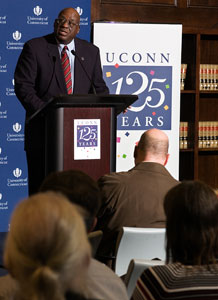  |
| HOME | THIS ISSUE | CALENDAR | GRANTS | BACK ISSUES | < BACK | NEXT > |
Reflections on UConn’s past, future, mark Anniversary kick-off eventBy Richard Veilleux & Sherry Fisher - January 30, 2006
|
||||
|
Alfred Rogers, ’53, couldn’t hold back his emotions as he recalled being a student at the University in the early 1950s. A student leader, he was one of a handful of minority students on campus at the time. “At Storrs, in ’49, exclusion by color or race was not a factor,” he said. Rogers an African American, had been accepted into Phi Epsilon Pi, a white, Jewish fraternity, but was rejected by the national organization. The local chapter threatened to secede, and “worked tirelessly” recruiting other chapters to do the same. “Ultimately, but not right away, the national chapter backed down,” he said. “The experience with Phi Epsilon Pi was an example of a team of committed Americans who were determined to strike a blow for intolerance and bigotry on their watch,” he said. Rogers shared his memories of a piece of UConn history with a crowd of several hundred people Jan. 25 at the University’s 125th Anniversary kick-off celebration at the the Wilbur Cross Building. “The decade of the 1940s and 50s was a period of social and economic change,” Rogers said. “After the war, the world would never be the same. “Industrial mobilization brought an end to the depression of the 1930s. Returning vets had a greater opportunity for higher education and a larger piece of the American pie,” Rogers said. “African Americans, many of whom moved from the agricultural south to work in northern cities, would stake a claim for equality and greater opportunities.” But, Rogers said, “patterns of discrimination denied them economic and social equality. Although laws did not mandate segregation, tradition and practice often brought about the same results.” Rogers said he decided to join Phi Epsilon Pi because he liked the fraternity members. “I was impressed by their candor. Many were vets of World War II. I truly enjoyed their company. “But the lessons I brought away – there were several – never judge a man by the color of his skin. If you want to achieve something, make a plan, establish a set of objectives, analyze your resources, establish strategies, and give it your best shot.” President Philip E. Austin said what attracted him to the University when he came here nine years ago, “was the sense of an institution moving very fast into the 21st century. There was, and there still is, a sense of momentum and a sense of tremendous possibility.”
He added, “We were and still are on our way to becoming not just the number one public university in New England, but one of the major public universities in the United States. The building program was, and is, part of that, but the buildings are as much a symbol of what we can be as they are an instrument to that end.” He said one of the University’s greatest assets is its strong partnership with the Town of Mansfield. “That partnership is moving toward the creation of a vibrant downtown, which will serve the students, the faculty, the staff, and the community.” Mayor of Mansfield Betsy Paterson started working at UConn when Homer Babbidge was president. “As we enter the 21st century, we are working in harmony to create a vibrant college community,” she said. “One of the keys is the downtown partnership, but that is only one of the many partnerships. There is much work going on behind the scenes.” She listed more than a dozen areas where UConn faculty, staff, and students work with and help the town of Mansfield, including clearing trails, cleaning parks, and coaching youth sports teams, as well as working together to improve spring weekend. “So to those who say we have only an adversarial relationship, I say you are wrong,” she said. “There are bumps in the road, but we work together to smooth them out.” Walter Woodward, assistant professor history and State Historian, said the experience of serving on the 125th anniversary committee gave him “a much deeper appreciation of our past traditions and our heritage.” In addition to the opening of a 125th anniversary exhibit, the Conn-Men, a student a cappella group, sang the University’s Alma Mater. The celebration marks the start of a yearlong series of events and activities highlighting the institution’s history since its founding in 1881. |
| ADVANCE HOME UCONN HOME |

